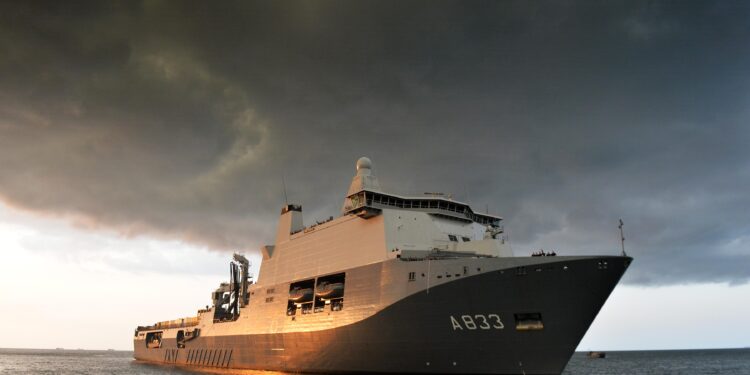Distress Signal from Humanitarian Vessel Amid Drone Assault Near Malta
A humanitarian ship en route to Gaza has sent out an urgent distress signal after reportedly being targeted by an unidentified drone off the Maltese coast. This troubling event raises notable alarms about the safety of humanitarian operations in volatile regions, occurring as the vessel was set to deliver crucial supplies to a territory in dire need.Eyewitnesses and officials described a chaotic scene as the crew grappled with the shock of this suspected aerial attack. Authorities are currently probing this incident, which complicates an already delicate humanitarian situation. This occurrence highlights the dangers faced by those providing aid in conflict zones and raises critical concerns regarding security for aid missions operating in increasingly hostile environments.
Drone Attack on Aid Vessel Indicates Escalating Tensions in Mediterranean
The distress call from a humanitarian ship bound for Gaza following a reported drone strike near Malta has sparked immediate concern among international observers about rising tensions within the Mediterranean region. Accounts from witnesses suggest that a military-grade drone approached at low altitude, prompting swift maritime responses from nearby vessels. Even though crew members managed to maintain control over their ship, this incident underscores the precarious conditions faced by humanitarian missions navigating through turbulent waters.
As maritime security becomes increasingly vital,various stakeholders are advocating for heightened vigilance amid escalating tensions. Incidents like these contribute to fears surrounding potential escalations that could jeopardize lives. Observers are calling for:
- Immediate international investigations into identifying the origin of the drone.
- Enhanced protective measures for humanitarian operations within affected regions.
- Diplomatic initiatives involving Mediterranean nations aimed at reducing current hostilities.
The global community is now focused on how such incidents affect regional stability and pose threats to those committed to providing essential assistance.
Consequences of Drone Assault on Humanitarian Missions
The recent attack on an aid vessel heading towards Gaza not only raises alarms about maritime security but also emphasizes broader implications for future missions operating within conflict zones. Humanitarian organizations rely heavily on secure transport routes for delivering essential supplies; aggressive actions like these can severely disrupt relief efforts. The increasing violence and hostility in critical areas undermine principles of neutrality and complicate access to vulnerable populations already suffering due to prolonged conflicts.
This incident may compel organizations to adopt stricter safety protocols, possibly leading to increased military presence around aid shipments—resulting in delays and significantly higher operational costs. Stakeholders must consider several factors moving forward:
- Risk Assessment: Identifying high-risk areas and adjusting shipping routes accordingly.
- Cohesive Strategies: Collaborating with international law enforcement and military entities to ensure safe passage through dangerous waters.
- Evolving Protocols: Enhancing vessel security measures and response strategies against rapidly changing threats.
The repercussions of such attacks extend beyond immediate dangers; they could reshape operational strategies employed by humanitarian missions working under unstable conditions.
Imperative for Enhanced Maritime Security Supporting Humanitarian Efforts
The recent SOS from an aid vessel bound for Gaza following a purported drone strike near Malta underscores an urgent need for improved maritime security protocols specifically designed to protect humanitarian initiatives. As these operations become more vulnerable amidst geopolitical instability, it is crucial that international bodies take decisive action against potential threats facing unprotected relief efforts.
This attack serves as a stark reminder that without coordinated safety measures at sea, vital humanitarian work remains endangered not just due to military conflicts but also because of insufficient maritime safety frameworks.
To effectively safeguard these essential missions, enhancing maritime security requires a complete strategy including:
- Aggressive Naval Patrols: Increasing naval presence in identified high-risk regions can deter possible aggressions against vessels carrying aid supplies.
- Collaborative Intelligence Sharing : Facilitating dialogue between nations enhances awareness regarding emerging threats while coordinating timely responses.
- Adoption of Advanced Technologies : Utilizing tools like drone surveillance can provide real-time situational awareness during transit periods.
Additionally, it is imperative that global organizations establish clear guidelines aimed at safeguarding vessels engaged in delivering assistance during crises—a dedicated forum should be created where stakeholders collaborate on strategies prioritizing human welfare amidst ongoing geopolitical strife .
Security Measure | Description | Naval Patrols | Deploying naval forces strategically across vulnerable waters deters attacks targeting relief ships . | < < < < < p ADVERTISEMENT |
|---|















